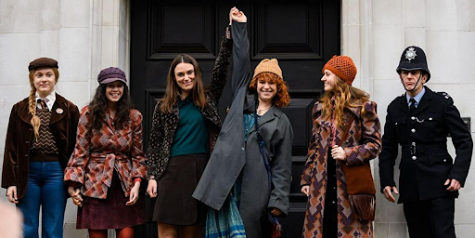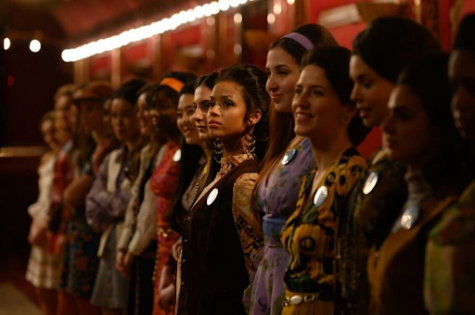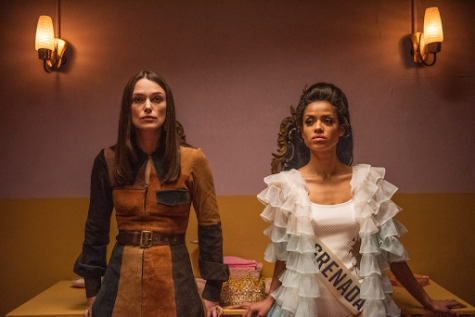Despite mediocre reviews from critics and being called “one-dimensional” by the New York Times, the 2020 UK film “Misbehaviour” is one we should all be talking about.
The movie follows the key players and events leading up to the 1970 Miss World Pageant, infamously known for being interrupted by women’s liberation protestors and crowning the first-ever Black Miss World. With impressive performances by a well-stacked cast, including Kiera Nightly, Jessie Buckley, Gugu Mbatha-Raw, Loreece Harrison, and more, “Misbehaviour” is definitely a must-see.

Kiera Nightly stars as Sally Alexander, an aspiring student, divorcee, and single mother, who is desperately fighting for her “seat at the table” in the male-dominated world of academia. After continually being dismissed by her sexist colleagues at the University of London, she crosses paths with Jo Robinson, a fiery young activist who is determined to overthrow and dismantle the patriarchy by causing as much disruption as possible. Played by Irish actress Jessie Buckley, Jo and her rag-tag group of angry feminists join forces with a defeated Sally, collectively deciding to make a stand for women by protesting the Miss World Pageant.
Opposite Jo and Sally are black pageant contestants Jennifer Hosten and Pearl Jansen, who have distinctly different views on the Miss World Pageant and the women’s liberation movement. Jennifer, played by the radiant Gugu Mbatha-Ra, is the first woman from her country of Grenada to be represented in the pageant. To Jennifer, while just being honored as one of the contestants is an incredible opportunity, winning could earn her the ability to receive an education to pursue her dream of broadcasting and provide representation for little black girls all across the globe.
Likewise, participating in the pageant holds special meaning for Pearl Jansen, played by Loreece Harrison. Invited to compete at the last minute to appease the anti-apartheid protestors, Pearl was chosen to represent the oppressed black population in South Africa as “Miss Africa South.” While Pearl is happy to be a part of the Miss World Pageant, she fears returning home and what awaits her and her family when she goes back to her country.
The movie also features appearances of other memorable characters, including the comical yet mildly sexist Miss World owner, Eric Morely (Rhys Ifans), and Bob Hope (Greg Kinnear), the sleazy pageant host whose blatant sexism and objectification of women make him a clear target for the angry feminist protesters.

While at first glance, this movie appears to be just another feel-good film promoting female empowerment, “Misbehaviour” provides profound insight into the idea of intersectional feminism and how this concept of female empowerment can look different among various groups of women.
As the main protagonist, Sally represents the typical, middle-class feminist woman fighting for equality and her voice to be heard. Contrary to Sally’s more composed, intellectual approach to inspiring change, Jo’s chaotic actions and a fierce hatred for “the system” make her an ideal representative of the more aggressive side of the feminist movement, reflected in her love of graffiti and constant need to push boundaries.
However, when these characters are juxtaposed with contestants Jennifer and Pearl, it becomes clear that “female liberation” is truly a matter of perspective.
The same beauty pageant, which Sally and Jo view as demeaning and sexist, is considered by Jennifer and Pearl as an opportunity to be truly seen for the first time.
This clash between opposing viewpoints is reflected in arguably the movie’s best scene, where Sally and Jennifer meet for the first time after the pageant is over. Both women express the fact that they do not resent each other at all and recognize that they are both fighting for equality for women, just in different ways.
Tiktok creator Raven (@raven_d14) said it best in a powerful video, saying, “The movie celebrates and doesn’t demonize either side of this equation, while also demonstrating that for every white woman trying to break the glass ceiling, there is a woman of color hoping to just get into the building.”

Putting the plot and subject matter aside, the movie as a whole is easy to watch and highly entertaining.
The brilliant screenplay by screenwriters Rebbeca Frayn and Gaby Chiappe frequently alternate between the perspectives of the movie’s key characters, enabling the audience to understand the unveiling events from all sides.
The attention to detail demonstrated in the set design and the film’s stunning costuming should be highly praised.
While the ending montage is a bit of a cliche, I appreciated how it showed both the characters and their real-life counterparts, reminding the audience that the events and stories of the women depicted in the movie are based on what actually happened in 1970.
The one critique I have after watching it was that I wanted to see more. I would have loved to have seen more scenes specifically of Jennifer and Pearl, giving more insight into their unique backgrounds.
Nevertheless, I was thoroughly impressed by “Misbehaviour” and give it 4 / 5 sails.

___
For more information or news tips, or if you see an error in this story or have any compliments or concerns, contact editor@unfspinnaker.com.















